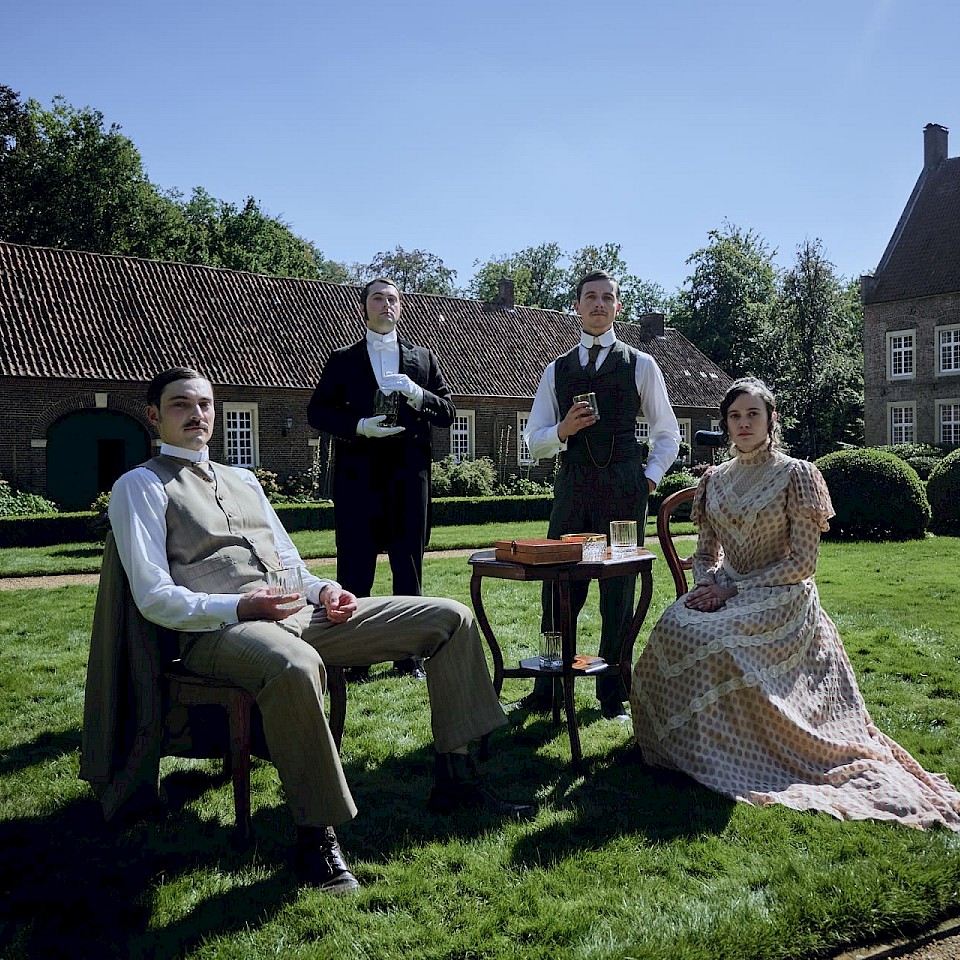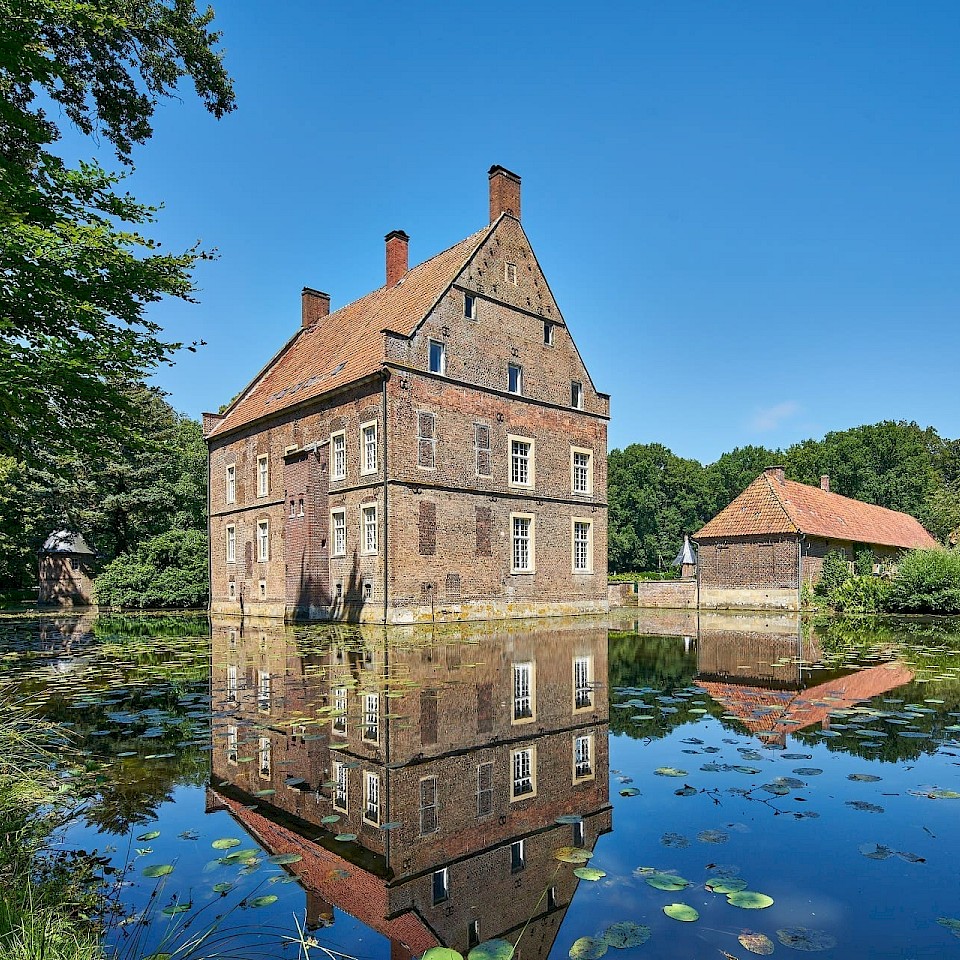The "Haus Kummerveldt" producer on the Grimme Prize, heroine Luise and the Münsterland as a film set
A historical story, told in a modern way: The series "Haus Kummerveldt", filmed in Münsterland, has long been causing a furore far beyond the region. The drama was supported by Münsterland e.V. during its production. Since 14 March, the team led by producer Lotte Ruf and director Mark Lorei has been celebrating its greatest success to date: the award of the Grimme Prize Special 2024. Before the award winners were announced, Lotte Ruf spoke to Münsterland e.V. about her work on the successful project.
"More than I ever dreamed of"
Mrs Ruf, your series "Haus Kummerveldt" is already an award-winning success story. What does the nomination for the Grimme Prize mean to you?
To be nominated for the most important German television award with my very first production is more than I ever dreamed of. It's a great honour. We are hoping for a career boost, which will also make it much easier to finance the next season.
What was your reaction to the nomination?
I missed a call from Fabian Nolte, who plays the valet in the series, at half past eight in the morning. Shortly afterwards, he sent me a link to the Grimme Institute without comment. To read "Haus Kummerveldt" in the list of nominations is still unbelievable to this day. That 18th January was a bit like a birthday: someone was always calling to congratulate me, it was great.
How often do you visit the Grimme Institute website?
Once a day, at least. It helps to counteract small low blows in everyday life - no matter how bad a mood you're in. I'm waiting for the day when I've processed this news.
Work on "Haus Kummerveldt" began seven years ago. What was the initial idea?
Back in 2017, Mark Lorei made a short film set in the context of castles and nobility in the Münsterland region. This gave rise to the idea of telling a longer story about the landed gentry in the 19th century with references to the present day. The main focus was to be on the social and sexist patterns that were more pronounced back then, but are unfortunately still an issue today. This became "Haus Kummerveldt".
"Not a dusty cliché, but a super modern historical film"
You've been a producer in the team since 2018. What is behind your job?
As a producer, I make things happen. When a director like Mark Lorei comes to me with an idea and I believe in it, I put all my energy into realising it. Being a producer means a lot: for example, acquiring money, writing funding applications and putting together the team. You have to find the right creative minds for the project. Public relations and contracts with broadcasters are also part of my job. And in between, I look for someone to provide a carriage, for example, because it has to be in the picture spontaneously.
When is a project finished for you?
When the material is ready on the hard drive, my job is not over. The most important thing is to start marketing the film or series - after all, it's meant to be seen by the public. In principle, I accumulate more and more projects over the years, but I never finish one completely.
What characterises "Haus Kummerveldt" for you?
What I love about the series are the moments of surprise: breaks in style through the music, but also inserts such as re-staged paintings. It's not a dusty cliché, but a super modern historical film. "Haus Kummerveldt" shows the nobility in everyday life, approachable and personal. And so far removed from an audience or a grand ball, which we have often seen in films.
The intro is also unusual: fruit arranged like a painting spoils in quick succession.
The intro shows transience in the form of a typical still life of the time. None of it was animated, by the way; the entire process took twelve weeks. We filmed the intro in our cameraman's former children's room. Despite the heating being turned up all the way, after three weeks hardly anything had happened to the fruit, and a while later things really got going. Because it stank so much, we had to enter the room wearing protective masks. In the end credits, we mention our cameraman's mum under "Special Thanks" - for having gone through this disgusting thing at home.
Nobody knows exactly how people lived back then. How did you approach the story?
With a production like this, the question of authenticity automatically arises. The perspectives of the filmmakers are always taken into account; we can only create an illusion of an authentic historical world. And we don't want to conceal this. This is another reason why anachronisms are part of "Haus Kummerveldt", like the split screens and the punk - clearly not historical elements.
"We drew on several biographies for the life of Luise von Kummerveldt"
"Haus Kummerveldt" is set in Münsterland. What part does the region play in its success?
The series wouldn't exist without the Münsterland region. The pilot episodes filmed in 2019 were financed entirely by sponsors and partners from the region. Nobody in the film industry believed in the project at the time. The mere mention of a historical film - often seen as too difficult and too expensive - quickly put us out of the running in discussions. In Münsterland, everyone said: "Great, we think it's great!" We are very grateful for this incredible support. We were also welcomed with open arms at our filming locations in Münsterland.
The series is set in and around castles. What was important when choosing the locations?
Whether a location is suitable for filming depends on various factors. On a tour through Münsterland, we looked at one house after another. Some we had to rule out immediately because there was a country road next door - too loud for the sound, problematic for the image due to the visible traffic. At Vischering Castle in Lüdinghausen, for example, we couldn't film inside because it houses a museum with renovated and barrier-free rooms. However, the courtyard and the castle from the outside were ideal.
The moated castle Haus Welbergen in Ochtrup became the ancestral seat of the von Kummerveldt family.
Guided tours are possible there, but there is no daily museum operation. We were also impressed by the fact that it is still largely furnished like a 19th century home.
To what extent have the locations influenced the story?
The search for locations and the creation of the script ran parallel for us. For example, we knew we needed a bedroom, a kitchen and a courtyard. Once it was clear which ones we would use, the script was adapted to the local conditions. Sometimes you discover a setting that is so strong that scenes have to be written for it, such as the scenes in the garden of Haus Welbergen, like the cake fight or the boules game.
Luise's role model is one of Münsterland's most famous personalities. What role does Annette von Droste-Hülshoff play in "Haus Kummerveldt"?
We are not filming her story, but "Haus Kummerveldt" is inspired by her life and those of several other female authors. Annette von Droste-Hülshoff was lucky enough to be able to publish under her own name - unlike most women writers at the time. For some, it only came to light towards the end of their lives or posthumously that they were behind their male pseudonym. We probably still don't know anything about others.
What interests you about these circumstances?
A lot of female authors from back then are commonplace in school lessons today. It is often forgotten how much they had to fight to get their texts published at all. For the life of Luise von Kummerveldt, we drew on several biographies. And we were able to film in the library at Hülshoff Castle.
It is the poet's original library.
Being able to use this location for "Haus Kummerveldt" was something very special. Mark Lorei once said with a wink that he could feel Annette's spirit.
"We want to keep going"
You already mentioned putting together the team, one of your tasks as a producer. How did you manage to pull together artistically on "Haus Kummerveldt"?
The "Haus Kummerveldt" team is unique. Most of us have been part of it since day one in 2018 and have experienced every step of the project; everyone has been able to contribute their own visions. In the beginning, we had no money at all, then a little and finally very little. We still haven't reached the standard of a normal production, but are working in the low-budget sector. "Haus Kummerveldt" has welded us together, we have become a film family. And although this is our profession, nobody sees the project as just one of many jobs. We motivate each other.
Was it always easy for you to stick with "Haus Kummerveldt"?
At times I thought: This can't be true, maybe it will never come to fruition! There were two and a half years between the pilot episodes and the sequel, during which we were desperately trying to finance the project at times. It was a question of being able to pay everyone involved. It was frustrating to hear a categorical no to a historical project from some broadcasters - before anyone had even looked at our material. But never frustrating enough to give up.
Haus Kummerveldt" has already been shown on the big screen several times, starting with the premiere in Münsterland. What's it like to see your own series like this?
Experiencing "Haus Kummerveldt" in the cinema, in a Dolby surround mix, gets under your skin. I know the series by heart by now. The exciting thing is the very different reactions of the audience - which punchlines make them laugh, for example. That's why I'd love to sit in the front row at the cinema with a view of the audience.
Which reaction do you hear most often?
One that gives you a tailwind: "When will it go on? We want more!"
What is your answer?
We want to continue, are writing the script for a new season and are talking to sponsors and broadcasters. "Haus Kummerveldt" was the reason for Mark Lorei and I to found a production company that we will continue beyond "Haus Kummerveldt". It is no longer a single project, but an integral part of our lives.
The interview was conducted by Christoph Schwartländer.
Lotte Ruf, born in Düsseldorf in 1996, studied Film & Sound at Dortmund University of Applied Sciences and Arts and completed her bachelor's degree in film production with the series "Haus Kummerveldt". She was honoured with the audience award at the "First Steps Award". Lotte Ruf is currently studying for a Master's degree in Film & Television Production at the Film University Babelsberg KONRAD WOLF. Together with director Mark Lorei, she founded the production company Goldstoff Filme GmbH in 2022, based at Haus Itlingen in Ascheberg-Herbern.
In addition to "Haus Kummerveldt", they also produced the short film "Die Spökenkiekerin und das Fräulein", which can be seen in the ARD Mediathek until 31 March 2024. Currently in development is the short film "The Baroness", based on the Münsterland fairy tale "The White Lady", which is also funded by the Regional Culture Programme NRW (RKP). Filming is scheduled to take place in autumn 2024.















